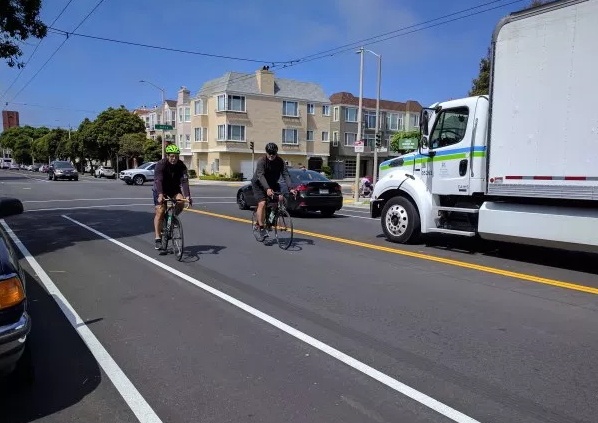Note: Metropolitan Shuttle, a leader in bus shuttle rentals, regularly sponsors coverage on Streetsblog San Francisco and Streetsblog Los Angeles. Unless noted in the story, Metropolitan Shuttle is not consulted for the content or editorial direction of the sponsored content.
Arguello Boulevard just got a fresh coat of asphalt and 'safety upgrades.' But, alas, no protected bike lanes--just more of the same kind of door-side designs that killed Tess Rothstein and have severely injured so many others.
Advocate Matt Brezina, who brought Arguello's deficiencies back onto Streetsblog's radar, also stressed that cars continue to speed on this heavily used cycling route connecting Golden Gate Park and the Presidio, making more collisions and injuries inevitable.
The project isn't finished and some buffers are coming, but that doesn't change the fact that the fundamental design is old-school and flawed. "Large segments of the bike lanes on Arguello place riders the 'door-zone,'" said Winston Parsons, who used to lead youth rides and currently advocates for senior safety in the area. "Ensuring that painted bike lanes, the low-hanging fruit of bike infrastructure, don't place riders directly in the path of car-doors seems like the absolute minimum design consideration. Failing at that basic principle is pretty disappointing."
👀 Arguello is a critical N/S bike route. Newly paved with 16ft car travel lanes, 8 ft parking lanes and 4 ft doorzone unprotected bike lanes next to 35mph cars. This same street design killed Tess Rothstein @sfmta_muni @SandraLeeFewer @sfbike We need Protected Lanes on Arguello https://t.co/8CK0HHzkSJ
— Brezina 🇺🇦 🌳👧🏼👶🏽🌳 (@brezina) May 29, 2019
The stretch alongside Rossi Playground, which runs from Edward to Anza Street, is especially maddening. On the east side of the street at least, there aren't any driveways (SFMTA's knee-jerk excuse for not installing protected bike lanes). The trolley bus wire is positioned well over the motor vehicle lane, so buses aren't an issue. There are no buildings, so no reason for a fire department ladder truck to need curb access.
"Staff is looking into the possibility of installing a parking-protected bikeway along Rossi Playground," wrote Paul Stanis, Transportation Engineer for SFMTA's Livable Streets Division, in an email reply to Streetsblog, asking why there aren't any protected segments. He added that "Arguello Boulevard includes a high number of driveways along the project corridor with at least one for every residential building. Installing a parking-protected bike lane along Arguello would result in removing at least 90 percent (roughly 230) of all parking and loading spaces over the mile-long corridor in order to provide sufficient daylighting at driveways and cross streets."
Perhaps SFMTA can develop a formula for how many broken bones, traumatic brain injuries, and deaths are required before we consider giving up 230 free car-storage spaces. But even that's a red-herring. As Streetsblog has pointed out many, many times before, countries that prioritize safety have figured out how to accommodate protected bike lanes on streets with driveways and parking (here, again, is our go-to video from the Bicycle Dutch blog which shows how it's done).
"Thanks to interest from Supervisor Sandra Fewer, we've been working closely with her office to identify opportunities to improve the bike lane on Arguello Boulevard. We know this is a critical park-to-park connection for Richmond District residents and beyond, which is why we've been advocating for bike safety improvements here since 2014," said Kristen Leckie, community organizer at the SF Bicycle Coalition, in an email to Streetsblog. "We're going to keep working with Fewer to keep pushing on the City to upgrade this bike lane, which carries hundreds of people a day."
Meanwhile, at today's SFMTA board meeting, the agency voted unanimously to streamline the process for installing protected bike lanes and to allow engineers to do safety upgrades without requiring a board vote. "Fourteen people hit and killed while walking and biking in five months," said the SFBC's Charles Deffarges, one of several speakers at the meeting in favor of the new process. "By fundamentally changing the approval process for life-saving street safety projects, we can streamline resources towards known high-injury corridors to prevent deaths and injuries on our streets rather than react to them."
But, of course, that also requires SFMTA engineers to adopt world-class designs and insist they get installed on all high-injury corridors, including Arguello.






